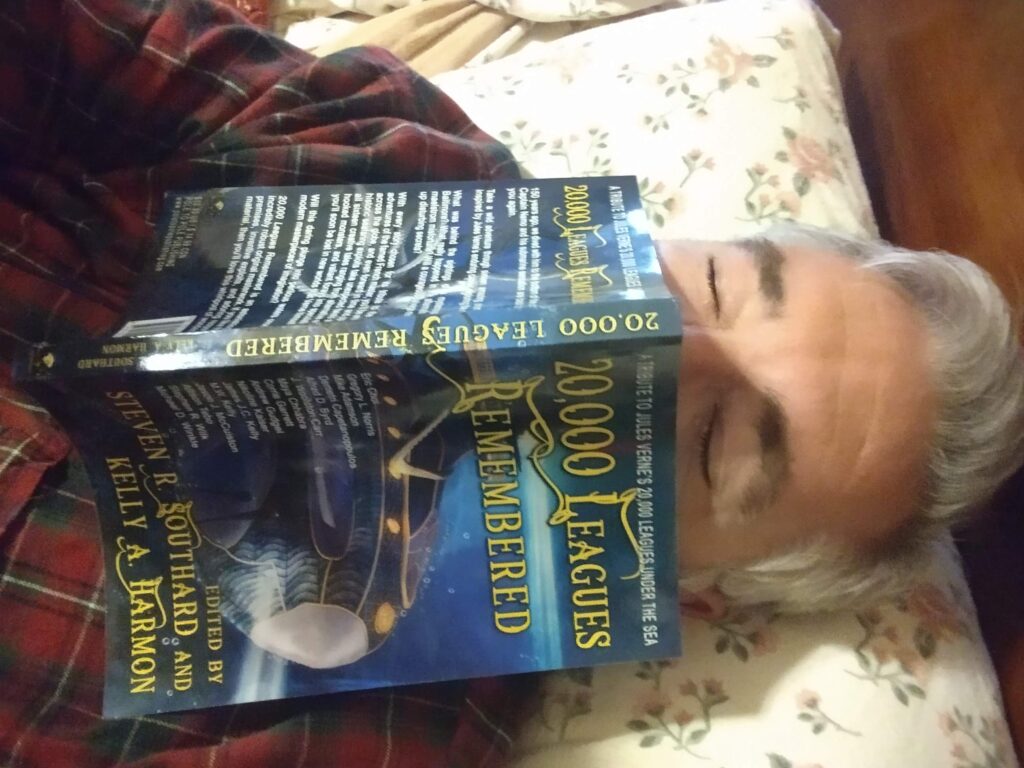Many people read in bed at night. Researchers tell you it’s good for your sleep and overall health. I disagree. Let me explain.
First, I know all the reasons people urge you to read in bed. It helps you relax, stimulates your creativity, gives you more empathy, and makes you smarter. I’ve read blogs and articles by Maddie Thomas, Lilianna Hogan at WebMD, Jodi Helmer, and Dr. Michael Breus. Molly Cavanaugh even inflicts this practice on her children.
These people have it all wrong. Reading in bed is bad. No, I’m not talking about the blue light hazard. The danger I speak of is present whether you read ebooks or paper books.
No, I’m not talking about the supposed harm of reading horror stories or other unsettling books that might cause nightmares or insomnia. I’m talking about a peril lurking for you no matter what you read.
I’ll concede that science has shown reading in bed helps you sleep. True. I get that. But that’s not the point. Those researchers have it all backward.
My concern—my deep fear—isn’t about how reading affects sleep. I’m terrified about how sleep affects reading.
There’s not much research on that subject. Oh, there’s a paper called “The relationship between self-reported sleep quality and reading comprehension skills,” where scientists found a surprising result, that longer sleep times led to lower verbal efficiency, and poor sleep quality led to better reading comprehension.
But I’m not even talking about that. It’s not the amount of sleep that bothers me.
Here’s my scary theory. Our brains seem wired for pattern recognition. That skill enables us to form habits and cement them into routines and rituals.
If you read every night before bedtime, if you’ve developed and ingrained that habit, your brain has formed a solid link between reading and sleep.
That’s right. Your brain knows the pattern—seeing words means going night-night. You’ve made it a pleasurable pattern, thus a self-reinforcing one.
How do I know this? Where’s my research? Well, okay, I don’t have any studies to cite. The world cries out for experimental data on this vital subject. For all I know, researchers have tried, but as soon as they read their own paper, they fell asleep.
Where, you ask, is the danger? Who cares if your brain links reading with sleep?
Go ahead and think that, but don’t come crying to me when, during a meeting at work, you drop into slumberland when your boss displays a text-filled PowerPoint slide.
Don’t say I didn’t warn you when you’re driving, see stop sign, and pause to read it, only to fall asleep at the wheel.
Worst of all, and I can hardly bear to mention this unspeakable horror, it’s possible that, someday, you will fall asleep while reading a book written by—
Poseidon’s Scribe


You forgot to mention that it is sometimes hard to put a good book down and you stay up even later to read it.
Or when you pick a book up the next day and can’t remember the last 10+ pages you read.
Not to mention, the book induced dreams and nightmares.
🙂
Thanks for the comments. I agree–so many hazards. I only hope our warnings came in time to save people.